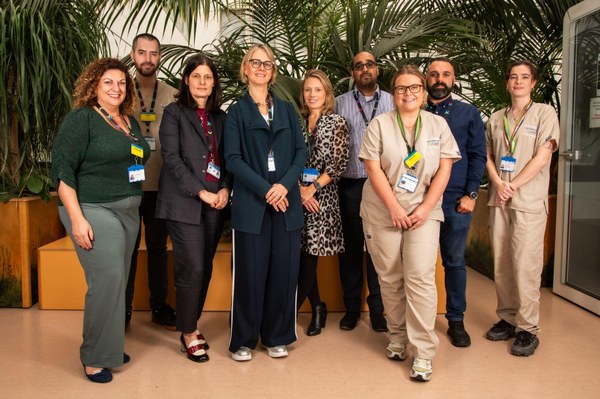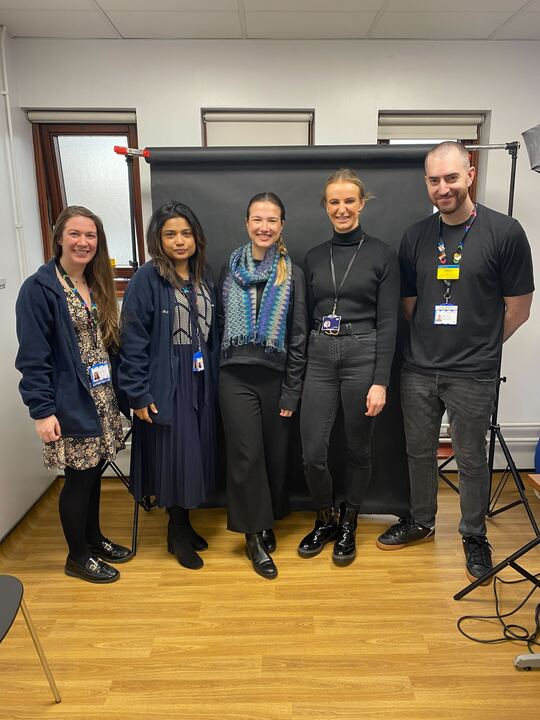Trust expands use of regulated AI to safely speed up patient access to skin cancer diagnosis and treatment
09 December 2024
Find out more about how the Trust is using AI-driven teledermatology to enhance patient outcomes and improve care.
Chelsea and Westminster Hospital NHS Foundation Trust is committed to using innovation to enhance patient outcomes and improve care.
The Trust first launched its teledermatology service in 2022 into the urgent suspected skin cancer pathway at Chelsea and Westminster Hospital. From the launch of the initial pilot, the service has assessed over 10,000 patients and has since become standard practice. From December 2024, the service has expanded Trustwide to support the dermatology team at West Middlesex University Hospital.
The teledermatology service involves taking high quality images of moles and lesions on patients' skin, using a smartphone with a dermatoscope attached. A dermatoscope acts like a magnifying glass and provides a detailed image of structures in the upper layers of the skin which are not visible to the naked eye.
DERM, developed by Skin Analytics, uses artificial intelligence (AI) to assess the images taken and is trained to classify the most common cancerous, pre-cancerous, and benign skin lesions. DERM performs to a level similar to that of face-to-face Dermatologist assessments, with a 97% sensitivity for skin cancer.
The majority of Trust referrals for suspected skin cancer do not result in an urgent skin cancer diagnosis so this will enable teams to reduce consultant time spent reviewing benign (harmless) conditions that do not need urgent treatment and prioritise patients with greatest need.
Autonomous AI is now being used at Chelsea and Westminster Hospital to effectively identify and discharge patients with benign skin lesions without validation by a dermatologist, releasing over 35% of dermatologist appointments for more urgent cases.
What does this mean for patients?
After a patient who is worried about a mole or skin lesion has been referred on the urgent suspected skin cancer pathway by their GP, they will be contacted with details of an imaging appointment. Prior to the appointment, the patient will be notified to fill out a medical history questionnaire.
At the appointment, the patient’s medical history is confirmed and images of their suspicious mole or skin lesion are captured.
Following DERM’s assessment, the patient’s case will be directed to the right level of care.
- If a patient requires further care or investigation with a Dermatologist, they will hear from the Trust shortly after the appointment detailing next steps.
- If a patient is discharged back to the care of their GP they will receive a letter within 2 weeks, with advice about how to monitor their skin
Skin Analytics has been supported by the CW Innovation programme, which is led jointly by CW+ and Chelsea and Westminster Hospital NHS Foundation Trust, and looks for ideas and innovations that support the everyday care of patients. The CW Innovation team has worked alongside colleagues in the dermatology service at the Trust, providing expert advice and guidance from the earliest stage of the Skin Analytics project.
The Trust’s AI-driven teledermatology service has been shortlisted for two HSJ Partnership Awards 2025. We are proud to be a finalist in the categories; Most effective contribution to improving cancer outcomes and Most impactful use of technology on clinical practice.
The service at Chelsea and Westminster Hospital was also shortlisted for a 2024 HSJ Award earlier this year in the Driving Efficiency Through Technology recognising an outstanding contribution to healthcare.



